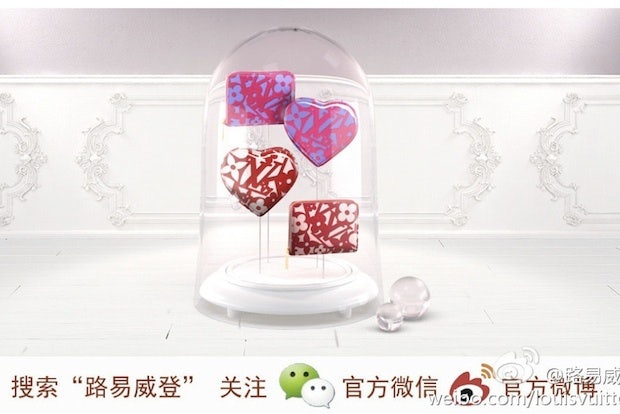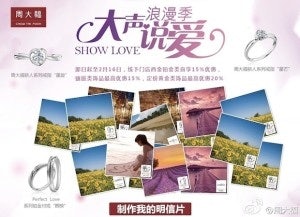
A Louis Vuitton Valentine's Day promotion on Sina Weibo. (Sina Weibo/Louis Vuitton)
Significant others across the world are scrambling to pick up flowers, gifts, and candy for Valentine’s Day today. Those who consider the prospect of finding the perfect present a challenge should be glad they don’t live in China—which has not one, but two love-centered holidays that come with the expectation of gifts.
The day has caught on as a full-fledged consumer holiday in China despite awkwardly falling right after the end of Chinese New Year, and being accompanied by the Qixi Festival in August, which is already a celebration of lovers. Regardless, luxury brands and retailers have been highly active with marketing on Chinese social media in hopes of encouraging high spending habits, and consumers certainly feel obligated to buy.
A perusal of Sina Weibo shows that many brands from all types of luxury categories, including beauty, fashion, jewelry, and cars, have special Valentine’s Day-related marketing promoting the same types of gifts they are selling to Westerners. While Piaget promotes rose-shaped jewelry and Mikimoto touts a heart-shaped necklace, Blancpain shows off a special set of couple’s watches and Louis Vuitton offers up its heart-shaped pouches. In addition, many brands, such as Audi, Lancôme, Kenzo, Clinique, and more are sponsoring special Valentine’s Day contests to win prizes on Weibo and WeChat. Meanwhile, luxury retailers are sponsoring campaigns as well: Hong Kong’s ifc is promoting special heart-emblazoned gifts by designers such as Tory Burch, 10 Corso Como Shanghai is offering special heart-shaped jewelry, and Galeries Lafayette is promoting products such as jewelry and perfume.
Foreign luxury brands made similar efforts during the Qixi Festival, or ‘Chinese Valentine’s Day,’ earlier this year. Most Qixi marketing efforts by Western brands could easily be interchangeable with today’s campaigns, as they also promoted similar red and love-themed gifts. This has prompted some Chinese commentators to criticize that foreign brands are trying to turn the traditional Qixi Festival into Western Valentine’s Day despite their different origins.

Chow Tai Fook's Valentine's Day campaign for February 14. (Sina Weibo/Chow Tai Fook)
One brand that did go all out on Chinese social media for both holidays with dramatically different campaigns was not a Western company, but Hong Kong jeweler Chow Tai Fook. The company took pains to create an elaborate online marketing campaign for Qixi Festival that took into account the holiday’s traditional Chinese story—giving away Angry Birds necklaces to represent its myth of lovers crossing over a bridge of magpies.
For this Valentine’s Day, the brand has created a “Loudly Proclaim Your Love” mini-site connected to Sina Weibo, in which users can send e-cards to one another with voice greetings—either self-recorded or with a recording in one of four different Chinese dialects. Users must then tag two additional friends in the love greeting before it is sent to the recipient in order to be entered for the chance to receive in-store discounts. Chow Tai Fook's multiple campaigns are a good example of taking each holiday's cultural significance into account while making innovations with available interactive technology.
Chinese consumers without a significant other are also covered by their own high-spending holiday—Singles’ Day. Taking place on November 11, the day is the largest e-commerce event in the world—proving that it’s not just couples who can be encouraged to spend big on a special day.